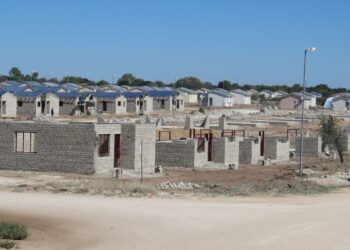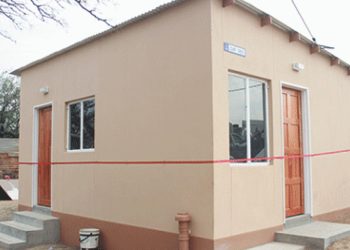
The Matutungu Property Fund (MPF), which was launched on Wednesday, plans to bridge the finance gap and reduce the country’s housing backlog.
Namibia has a housing backlog of about 300 000 housing units that would require N$76 billion for land servicing and housing construction, according to the government.
Jerry Muadinohamba, an official with MPF, said his company plans to play an intermediary role in raising capital and financing projects that are promoted by developers, entrepreneurs, individuals and various institutions that own land and want to develop and build housing.
“It is an initiative that would focus on property development finance with the primary purpose of enhancing access to finance in the property investment market. The prevailing housing crisis is a major concern and has been a lingering developmental problem,†he said.
Muadinohamba noted that the demand for housing, and more specifically affordable housing and serviced land in various towns and settlements has exhausted current supply. Furthermore, the level of under supply of serviced land and housing developments is exacerbated by a lack of suitable and affordable financing in order to implement bulk services and the required infrastructure.
He said the MPF will collaborate with architects, engineers, town planners and other key professionals in the value chain of property development.
“The intention is to create and grow property entrepreneurs that can deliver affordable, low and middle income residential and mixed use spaces. The ultimate goal is to address the demographics of property ownership and enable an effective participation of Namibians in the real economy,†Muadinohamba said.
“The MPF will also seek partnership with commercial banks, development finance institutions, local authorities and civil society organizations in closing the gaps in housing delivery.â€
He said MPF plans to appoint a Board of Directors supported by a Developments Advisory Board which will determine the collaboration framework and the regulatory requirements that would guide property development finance.
“It is known that both new and existing players in the real estate space have difficulties in preparing project and business plans, and accessing finance. It is against this background that the Fund would like to start off by inviting those that are faced with such constraints to explore our services and possible partnerships. The Fund will develop an extensive pipeline of projects and present those to its Developments Advisory Board with the consent and agreement of the interested developers,†Muadinohamba said.
He said through the Muadinohamba Family enterprise, various property investments had been undertaken over the past 10 years in towns such as Ongwediva, Walvisbay, Nkurenkuru, Katima Mulilo, Gobabis and Windhoek.
Â
“Among the future planned projects are Eenhana, Tsumeb, Hentiesbay and Karibib. The past 10 years has enabled us to understand the challenges faced by property investors and we bring that experience and track record to the table – with being nimble and intentional,†Muadinohamba said.
According to the FNB Bank Housing Index, Namibia remains a country with high property prices and a soaring housing-supply backlog, presenting opportunities in the sector to be harnessed.











